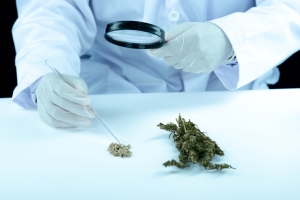Medical Cannabis as an Anorexia Treatment
For many of us, the feeling that we need to lose weight, even just a few pounds, is a constant battle. Movies, network channels, social media, and advertising create the image that being thin is a symbol of beauty, power, and success. Too often, this can lead to feelings of inadequacies, low self-esteem, and a negative body image, especially in women and young girls. For some people, the desire to become thin turns into a compulsion that can lead to self-starvation. Losing extreme amounts of weight is a dangerous behavior that can cause severe health issues, often leading to a life-threatening disorder called Anorexia.
Anorexia, also known as Anorexia Nervosa, is more than just about not eating and losing weight. It’s a medical condition where an individual takes extreme measures to lose as much weight as possible. A person may accomplish this by drastically limiting their calorie intake, excessive exercising, vomiting up any food they did eat, and misusing diet aids, laxatives, and diuretics. Losing weight becomes an obsession.
Once they have progressed to excessive weight loss, they become terrified of gaining any of it back. Attempts from concerned family and friends to get them to eat can drive them deeper into their fears and compulsions. The exact reason for Anorexia is not known. Some theories suggest genetic triggers that increase an individual’s risk of developing the disorder, societal emphasis on being thin, underlying psychological problems, or a combination of issues. It’s believed that individuals with Anorexia work to lose extreme amounts of weight and change their body shape as a way to cope with severe emotional problems. It may give them a sense of control in their life.
Anorexia Treatment
Anorexia treatment is a multi-layered care approach to work with the unique needs of each person. Medical doctors, mental health professionals, and nutrition experts work together to treat each aspect of the disorder. This approach often includes long-term psychotherapy, medications, nutrition education, and group and family counseling. Severe cases may consist of emergency intervention and hospitalization. Severe weight loss can cause life-threatening health issues such as dehydration, low blood pressure, irregular heartbeat, kidney failure, and death.
At this time, there are no Food and Drug Administration (FDA) approved medications for Anorexia. Antidepressants, anti-anxiety, and anti-psychotic drugs are often prescribed to help ease the psychological symptoms of the disease. Because Anorexia is a disorder where the individual doesn’t want to consume anything that might make them gain weight, they often refuse to take any medications. In severe cases of malnutrition, feeding tubes may be initiated to force nutrients and medicines into their systems.
For non-emergency situations, there may be a less invasive method to help ease the symptoms of the disorder. Medical marijuana for Anorexia may be a way to relieve symptoms without the use or in conjunction with prescription drugs.
Medical Marijuana for Anorexia
A more holistic option for individuals that may not want to take prescribed medications for Anorexia is medical marijuana. Although not approved by the Food and Drug Administration (FDA) specifically for eating disorders, cannabis has been used to ease symptoms for other conditions and diseases. Some of these include chronic pain, fatigue, Glaucoma, Multiple Sclerosis, muscle spasms, and HIV/AIDS,
The components in cannabis may ease some of the psychological symptoms of Anorexia due to its anti-anxiety and antidepressant qualities. Medical marijuana for Anorexia may help alleviate depression and anxiety that are both found commonly co-occurring in individuals with the disorder. The calming effects of some cannabis strains may also help ease some of the sleep issues that individuals coping with Anorexia may experience.
For HIV/AIDS and cancer patients, cannabis is routinely used as an appetite stimulant. It aids in calming severe nausea commonly associated with both diseases. The chemical components in medical marijuana that help to relax the mind and body, and increase the appetite may be helpful during Anorexia treatment to enhance the individual’s desire to eat.
Obtaining Medical Marijuana
You can get medical marijuana with a prescription received from a physician that is licensed in the state you live in, and purchase the substance at a qualified dispensary. A medical marijuana card can only be used in the state it’s issued in. Only the person the card was issued to can purchase prescription cannabis. There are currently no federal regulations for the use of medical marijuana. Each state and local governments have their own statutes regarding qualifying conditions approved for medical marijuana.
Anorexia treatment is different for each individual with the disorder. Although the main symptom of the disease is extreme weight loss, the underlying factors for why are unique to each person. Seeking treatment from medical doctors, psychiatrists, and nutritionists are all an essential part of the recovery process. The use of medical marijuana for Anorexia may be the additional piece of the puzzle that can help you find a place of calm and ease symptoms on your journey of healing.
Conclusion
Although the main symptom of the disease is extreme weight loss, the underlying factors why are unique to each person. Seeking treatment from medical doctors, psychiatrists, and nutritionists is an essential part of the recovery process. In addition to these traditional approaches, our medical marijuana doctors in Sarasota and in other locations can provide valuable support and guidance in incorporating medical marijuana as a potential adjunct therapy for Anorexia.
Medical marijuana has shown promise in addressing symptoms such as anxiety, depression, appetite stimulation, and promoting a sense of calm and relaxation. However, it is important to approach medical marijuana as part of a comprehensive treatment plan, under the supervision and expertise of qualified healthcare professionals.
They can evaluate your specific needs, assess any potential interactions with other medications, and recommend appropriate cannabis strains and dosages to complement your overall treatment. With a comprehensive and personalized approach, including the expertise of our medical marijuana doctors, you can find a place of calm and ease symptoms on your journey of healing.






